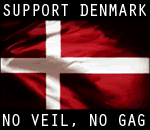Conservative?
Gene Edward Veith points us to Jeffrey Hart's Opinion Journal article entitled The Burke Habit:
In "The Conservative Mind" (1953), a founding document of the American conservative movement, Russell Kirk assembled an array of major thinkers beginning with Edmund Burke and made a major statement. He proved that conservative thought in America existed, and even that such thought was highly intelligent--a demonstration very much needed at the time.Mr. Veith follows the article with the posts below:
Today we are in a very different and more complicated situation. Nevertheless, a synthesis is possible, based on what American conservatism has achieved and left unachieved since Kirk's volume. Any political position is only as important as the thought by which it is derived; the political philosopher presiding will be Burke, but a Burke interpreted for a new constitutional republic and for modern life. Here, then, is my assessment of the ideas held in balance in the American Conservative Mind today.
- Hart #1: Are Conservatives conservative?
Jeffrey Hart, emeritus English professor at Dartmouth and a prominent conservative intellectual, has written an article that is rocking conservative circles. Entitled "The Burke Habit," published in the "Wall Street Journal" and drawn from his new book "The American Conservative Mind Today," he outlines the principles of conservative ideology as an intellectual and political tradition that goes way back into Western history. After that useful exercise, he then makes the case that, by that standard, today's conservatives are not really conservative.
- Hart #2: Against Utopias
Jeffrey Hart points out that a critical theme in the conservative tradition is to be skeptical of any kind of utopias. . . . . . From Sir Edmund Burke's critique of the French Revolution to the 20th Century opposition to Communism, conservatives have recognized the Christian truth that human nature is flawed, and that attempts to impose utopian schemes that deny that truth are inevitably disastrous and usually tyrannical. Hart gives a great quote from one of my favorite Christian writers and thinkers, Blaise Pascal: "Man is neither angel nor brute, and the misfortune is that he who would act the angel acts the brute."
- Hart #3: What conservatives agree on
Jeffrey Hart, in his essay on what conservatism is and isn't, cites some characteristics that even the neo-cons and Christian right whom he criticizes as being closet liberals can agree on: The importance of the nation (hence national defense, and, I would add, though he might consider it too lowerclass, patriotism). Constitutional government. Free enterprise economics. These principles, though, can be distorted by "utopianism."
- Hart #4: Conservative are supposed to love Beauty
In his conservative catechism, Jeffrey Hart observes that conservatives have traditionally valued and cultivated beauty. Not any more.
See also:
Hart emphasizes how free market economics, exaggerated in a utopian way to the source of all values, has reduced beauty to whatever sells. My point: Thus genuine culture is driven out by the pop culture, which becomes progressively coarse, sensationalistic, hedonistic, and fashion-driven. - Hart #5: The Conservative Approach to Religion
Continuing our seminar on the conservative tradition as outlined by Jeffrey Hart, he next stresses the importance of religion, but of a specific kind:
- Hart #6: Should conservatives make their peace with abortion?
His argument is essentially that conservatives, since they don't believe in the possibility of a utopia, accept that society is going to have its flaws and its immorality. After a point, conservatives accept reality and go from there. Today's culture wants abortion. Though Hart admits that Roe v. Wade was a flawed decision, he says that overturning it now would be not conservative but "Jacobin" (a reference to the radical French revolutionaries).
- Hart #7: Is spreading democracy conservative?
Here is his other hand grenade he tosses into the contemporary conservative movement: The war in Iraq and the goal of advancing democracy in the Middle East are not conservative. They are "Wilsonian." You remember President Woodrow Wilson, fighting World War I to "make the world safe for democracy; founding the League of Nations; all of those well-intentioned, idealistic foreign policy goals that blew up in everyone's face once Hitler and Stalin moved onto the world stage. Are American conservatives today repeating Wilson's mistakes?
- Hart #8: Are Republicans conservative?
Now we see Jeffrey Hart's upper class Northern snobbishness click in, when he complains that the Republican party isn't conservative, either, what with all those uneducated, fundamentalist Southerners tracking up the parlor:








<< Home